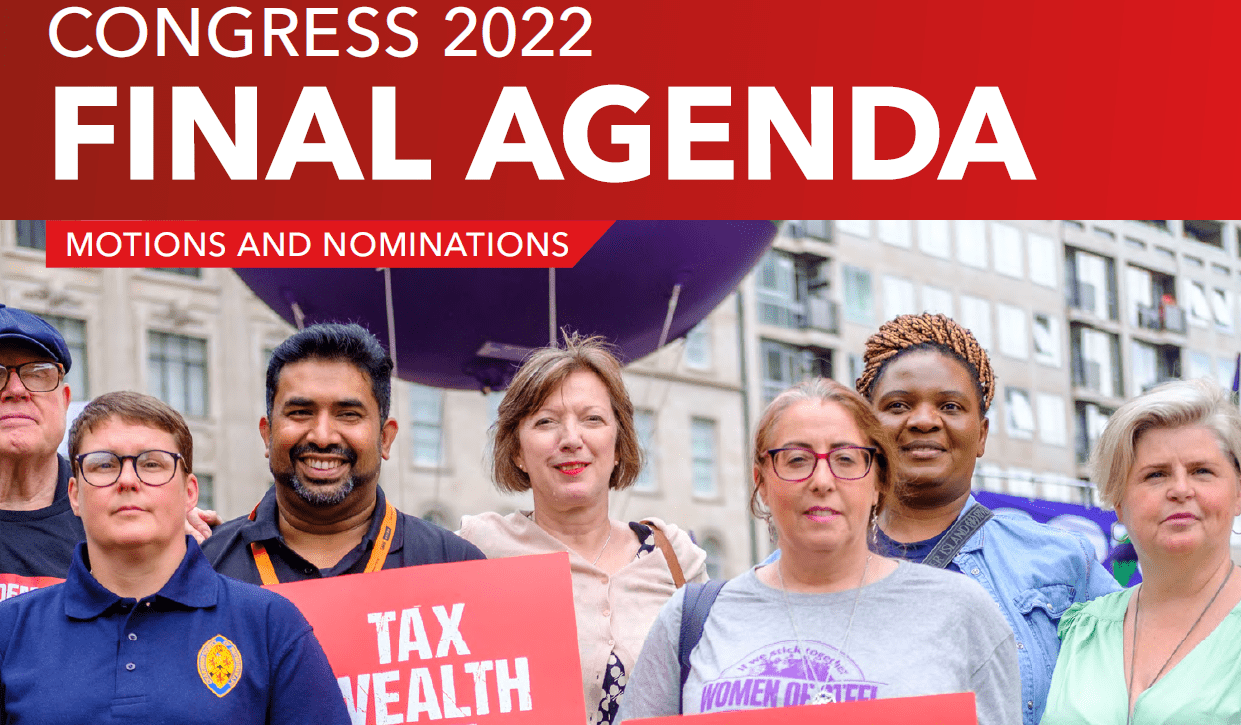By a member of the National Education Union
The TUC conference, postponed after the death of the Queen, opens next Tuesday, and the preliminary agenda has been published. Judged by the resolutions, it should make for an interesting conference.
Although some of the 72 resolutions put forward by the affiliated unions will be composited where they are similar, but the preliminary agenda reflects a number of key issues that affect ordinary workers, most notably on living standards and the fight to keep wages up with price increases.
Many unions, in one form or another express the anger of workers over the big hits on their living standards that employers and the Tory government are trying to impose and they repeat the call for a national minimum wage of £15 an hour.
But the key discussion at Congress will undoubtedly be around the calls from several unions for the TUC itself to coordinate industrial action where unions are planning strikes for decent pay rises. Early on in the agenda, there is an amendment from the Public and Commercial Services Union (PCS) to a resolution from UNISON.
If amended, the last paragraph of the UNISON resolution would then read:
“Congress calls on the General Council to establish, convene and provide resources for a special working group of willing unions which would organise coordinated action where possible with all TUC unions, including further demonstrations, national and regional rallies, and coordinated industrial action where possible”.
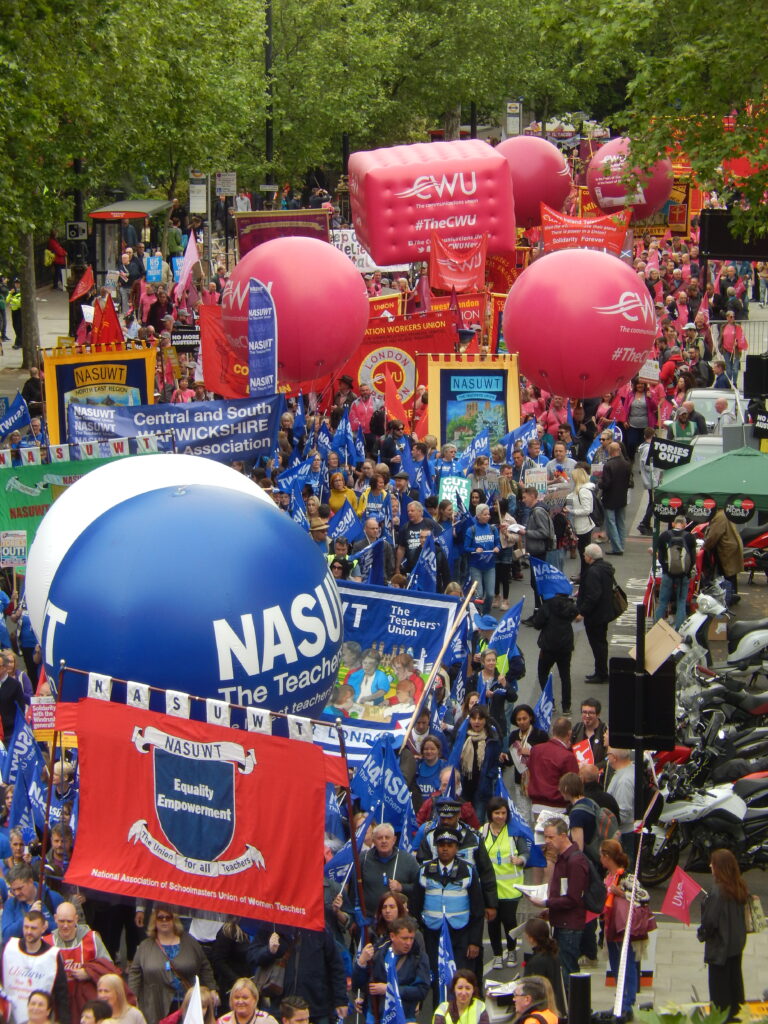
NEU calls for solidarity on the picket lines
The NEU more or less repeats the same argument. Noting the cost-of-living crisis as a key issue facing workers, it calls on the TUC to, “coordinate a campaign of industrial action across the public and private sector to win pay rises and improve standards of living”.
As if with a nod to Keir Starmer and other Labour leaders who refused to venture near picket lines, the NEU also calls for “solidarity actions with workers who have to strike to defend pay, pensions, jobs and standards for themselves and the wider public, including joining picket lines to publicly show support for workers in dispute”.
A resolution from Unite again links the issue of greater industrial leverage for unions with the crucial coordinating role that the TUC could play. On ‘Rebuilding industrial power’ the union calls on the incoming General Council to “facilitate and encourage industrial coordination between unions so that workers in dispute can most effectively harness their union power to win”.
Another resolution from the Fire Brigades Union calls on the General Council to campaign as a body on pay in the coming year, including: “a united campaign of public sector trade unions to challenge austerity, pay cuts and the increased cost of living” and it mandates the General Council “to take the necessary steps, in conjunction with affiliated unions and involving all political, industrial and legal means, to secure a decent pay rise for all workers”.
PCS calls for a united campaign of coordinated industrial action
The Public and Commercial Services Union has a resolution specifically on the issue of joint union action, part of which reads as follows: “Congress congratulates all unions taking industrial action to fight back. We note that, despite a media onslaught, there is widespread sympathy for strikes. Congress agrees that trade unions must lead the defence of working people in the UK and we call on the Labour Party to support all workers taking strike action”.
It then goes on to call on the General Council to:
“actively organise and support a united campaign of coordinated industrial action including convening a working group of unions in the public and private sectors to plan and coordinate action on pay and jobs” and “report progress in the campaign for joint action to affiliates on a monthly basis.”
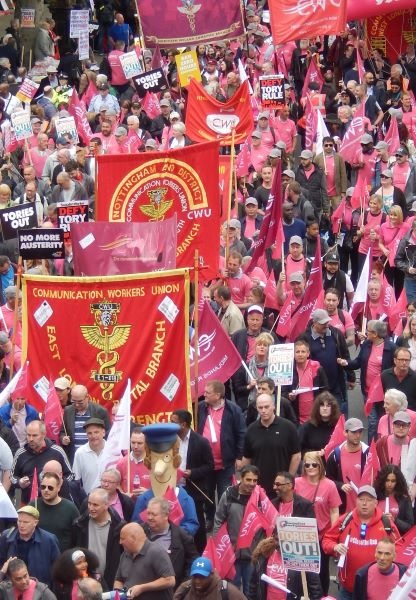
Last, but not least, there is the resolution from the RMT, also on the issue of the cost of living. “Congress believes” it says, “that, to strengthen our hand at this critical time, the General Council must, where possible, plan and encourage coordinated strike action between affiliates to maximise its impact and effectiveness”.
Difficult for the General Council to sit on its hands
With a well-deserved dig at Labour leader Keir Starmer, the RMT motion also makes the point that “the Labour Party should not stand on the side lines but should support our picket lines at the heart of this struggle to defend and improve living standards via the redistribution of wealth”.
If the sentiments within these motions are agreed by the conference – and it is hard to imagine them being voted down – it will be an important step forward. It would then be more difficult for the General council and the incoming TUC General Secretary, Paul Nowak, to sit on their hands while workers in different unions are, in effect, all fighting the same battle, but in isolation from each other.
A much more wide-ranging resolution comes from the Communications Workers’ Union, built around its support for community-based campaigns and campaigns like ‘Enough is Enough’. It points out that in-work poverty affects millions of workers.
As well as calling for Congress to agree “common bargaining structures across sectors of the economy” it calls for the TUC to be much more of a campaigning organisation than it is at the present. It calls, for example, for the TUC to take a lead on a programme of ‘town hall’ meetings and rallies across the country and to “launch innovative forms of collective action that all workers can participate in before the end of 2022”.
Unions calling for regular election of TUC general secretary
The CWU motion also reflects the urgency felt by several unions about the cost of living crisis, by demanding that the TUC begins to campaign as early as autumn this year. To expedite a campaign, the CWU calls for the TUC to “immediately hold special Executive and General Council meetings to sharpen the overall industrial and political demands of the campaign”.
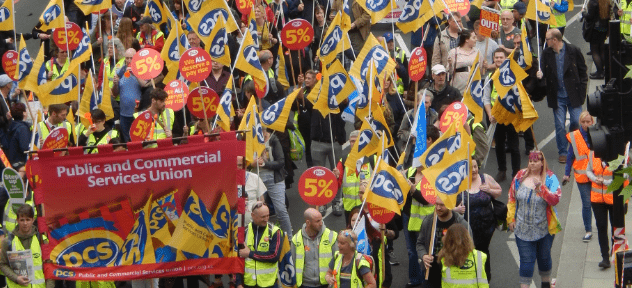
Although we cannot deal with it in detail, there are also a couple of motions, from the CWU and Equity, that in effect have a pop at the rigidity and lack of democracy within the structures of the TUC. The call is made by both unions for the regular election of the General Secretary and Assistant General Secretary every five years.
But the CWU also hints at a more effective campaigning role for the TUC (as does its other resolution) to make the TUC and affiliate structures “properly reflect the ethnicity, gender and diversity of the members we represent.”
The majority of the resolutions tabled for the TUC conference would be agreed by most socialists or activists in the labour movement. Few of the motions are out of kilter with labour movement principles and practices.
There is one, however, from the GMB union that deserves a mention. It is one thing to call for protecting the jobs and livelihoods of workers in the defence industries – as the union resolution does, and upon which socialists would agree – but it is entirely another matter to call for “an immediate increase in defence spending.”
That part of the GMB resolution would have been cheered in the Tory conference in Birmingham last week. As every teacher, nurse and care worker will tell you, each new pound spent on defence is a pound less spent on decent wages in education, local authorities, social care and the NHS. The GMB needs to do some joined-up thinking.
Is the TUC willing and able to provide the leadership needed?
There are seventy-two motions altogether and it is impossible to mention them all. All of the problems that are faced in the workplace are reflected there, to one degree or another. Many of these motions will pass on a show of hands without dissent.
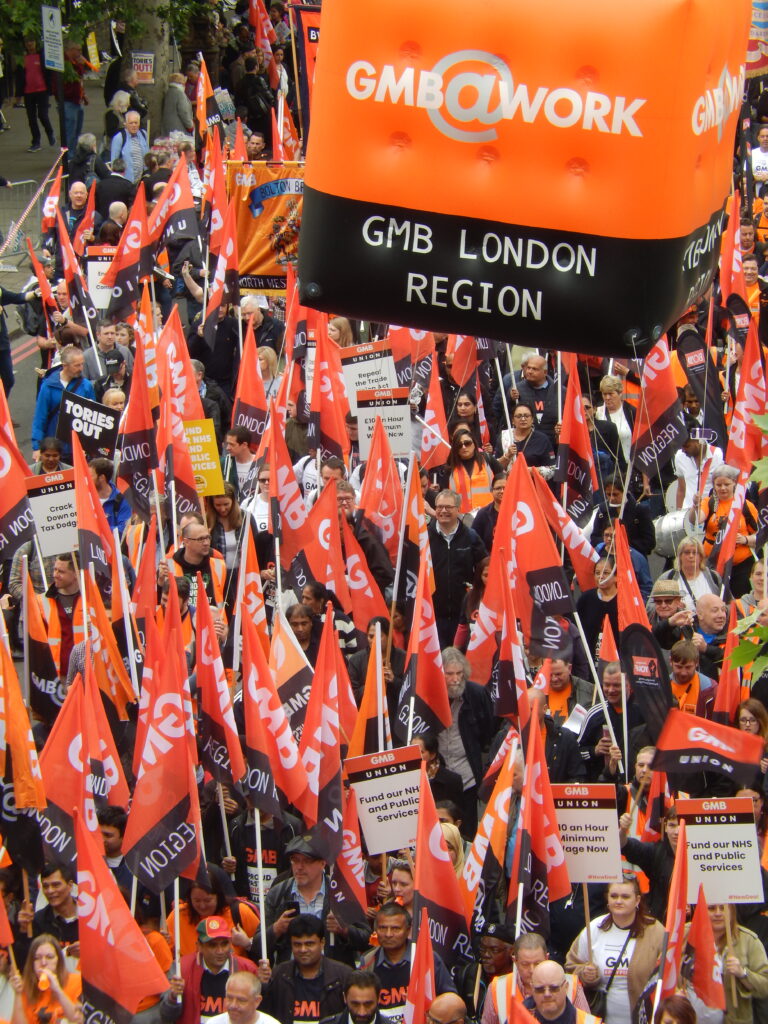
The crucial issue that will come out of this conference is to what degree the TUC leadership is willing or able to provide a leadership to workers struggling to keep their heads above water.
When 800 P&O workers were sacked in March, to be replaced by agency workers on half the wages, the TUC leadership effectively did nothing but bleat their objections. It was like watching a rabbit caught in headlights. That approach to the problems workers fact today is utterly inadequate. As much as workers needs a bold fighting union leadership on an industry-by-industry basis, they needs a clear, militant leadership at the top of the trade union movement, to provide the necessary coordination and campaigning voice that is needed.
Meanwhile, although it is nothing to do with the TUC conference, we might also add that employees of the largest union, UNISON, (many of whom are members of Unite) are having a consultative vote on strike action because the union will not move on its pay offer of a 3% increase. UNISON is quite properly urging its members to reject any 3% pay offers from their employers, but it seems happy for its office and support staff to take a cut in their living standards.

